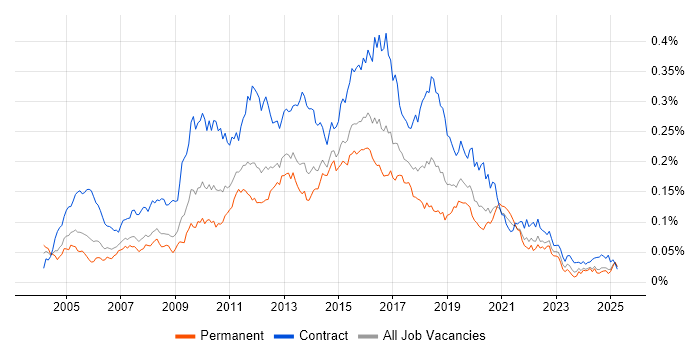ETL Developer
UK > UK excluding London
The median ETL Developer salary in the UK excluding London is £45,000 per year, according to job vacancies posted during the 6 months leading to 20 May 2025.
The table below provides salary benchmarking and summary statistics, comparing them to the same period in the previous two years.
| 6 months to 20 May 2025 |
Same period 2024 | Same period 2023 | |
|---|---|---|---|
| Rank | 582 | 748 | 734 |
| Rank change year-on-year | +166 | -14 | +79 |
| Permanent jobs requiring an ETL Developer | 9 | 9 | 21 |
| As % of all permanent jobs advertised in the UK excluding London | 0.023% | 0.013% | 0.035% |
| As % of the Job Titles category | 0.025% | 0.013% | 0.040% |
| Number of salaries quoted | 9 | 9 | 17 |
| 10th Percentile | - | £32,700 | £41,500 |
| 25th Percentile | £44,000 | - | £51,250 |
| Median annual salary (50th Percentile) | £45,000 | £55,000 | £55,000 |
| Median % change year-on-year | -18.18% | - | - |
| 75th Percentile | £46,000 | £58,750 | £67,500 |
| 90th Percentile | - | - | - |
| UK median annual salary | £45,000 | £58,750 | £65,000 |
| % change year-on-year | -23.40% | -9.62% | +8.33% |
All Permanent IT Job Vacancies
UK excluding London
For comparison with the information above, the following table provides summary statistics for all permanent IT job vacancies in the UK excluding London. Most job vacancies include a discernible job title that can be normalized. As such, the figures in the second row provide an indication of the number of permanent jobs in our overall sample.
| Permanent vacancies in the UK excluding London with a recognized job title | 36,162 | 67,952 | 52,783 |
| % of permanent jobs with a recognized job title | 90.75% | 94.86% | 89.22% |
| Number of salaries quoted | 18,671 | 47,990 | 30,170 |
| 10th Percentile | £26,968 | £26,750 | £29,750 |
| 25th Percentile | £37,500 | £35,000 | £38,750 |
| Median annual salary (50th Percentile) | £51,564 | £50,000 | £53,059 |
| Median % change year-on-year | +3.13% | -5.76% | +6.12% |
| 75th Percentile | £65,000 | £63,750 | £68,750 |
| 90th Percentile | £77,500 | £76,250 | £81,250 |
| UK median annual salary | £55,000 | £52,500 | £60,000 |
| % change year-on-year | +4.76% | -12.50% | - |
ETL Developer
Job Vacancy Trend in the UK excluding London
Job postings that featured ETL Developer in the job title as a proportion of all IT jobs advertised in the UK excluding London.

ETL Developer
Salary Trend in the UK excluding London
3-month moving average salary quoted in jobs citing ETL Developer in the UK excluding London.
ETL Developer
Job Locations in the UK excluding London
The table below looks at the demand and provides a guide to the median salaries quoted in IT jobs citing ETL Developer within the UK excluding London region over the 6 months to 20 May 2025. The 'Rank Change' column provides an indication of the change in demand within each location based on the same 6 month period last year.
| Location | Rank Change on Same Period Last Year |
Matching Permanent IT Job Ads |
Median Salary Past 6 Months |
Median Salary % Change on Same Period Last Year |
Live Jobs |
|---|---|---|---|---|---|
| West Midlands | +66 | 9 | £45,000 | +28.57% | 1 |
| Midlands | +65 | 9 | £45,000 | +28.57% | 1 |
| ETL Developer UK |
|||||
ETL Developer Skill Set
Top 29 Co-occurring Skills and Capabilities in the UK excluding London
For the 6 months to 20 May 2025, ETL Developer job roles required the following skills and capabilities in order of popularity. The figures indicate the absolute number co-occurrences and as a proportion of all permanent job ads across the UK excluding London region featuring ETL Developer in the job title.
|
|
ETL Developer Skill Set
Co-occurring Skills and Capabilities in the UK excluding London by Category
The follow tables expand on the table above by listing co-occurrences grouped by category. The same employment type, locality and period is covered with up to 20 co-occurrences shown in each of the following categories:
